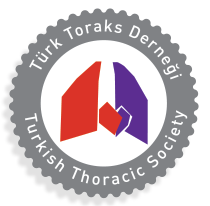Abstract
Abstract
Immunochromotographic test (ICT) is a rapid membrane-based serologic assay using 38-kDA antigen from M. tuberculosis for the diagnosis of tuberculosis. It is based on the principle that Ig G type of antibodies against M. tuberculosis antigens immobilized beyond a membrane are detected by a colloidal gold particle technique. In this study, 43 patients with active pulmonary tuberculosis and 20 control patients with pulmonary infections other than tuberculosis were analyzed. The patients with active pulmonary tuberculosis were diagnosed by means of bacteriological (positive smear and culture), radiological and clinical signs. Sera from the patients were tested by ICT commercial kits (ICT Diagnostics, Australia) according to the procedure provided by the manufacturer. ICT was found positive in 20 of 43 patients with active pulmonary tuberculosis and was found negative in all of the sera from patients in the control group (n=20). The sensitivity, the spesificity and the accuracy of the test were evaluated as 46.5%, 100% and 63.4%, respectively. However, the higher percentage of positive results has been obtained due to increasing antibody titers as the period of the illness and the severity of the radiological signs increased. In conclusion, although ICT does not have a diagnostic value when it is used alone, it is thought that it could be a useful method when it is used together with the bacteriological gold standart methods in the diagnosis of tuberculosis.



